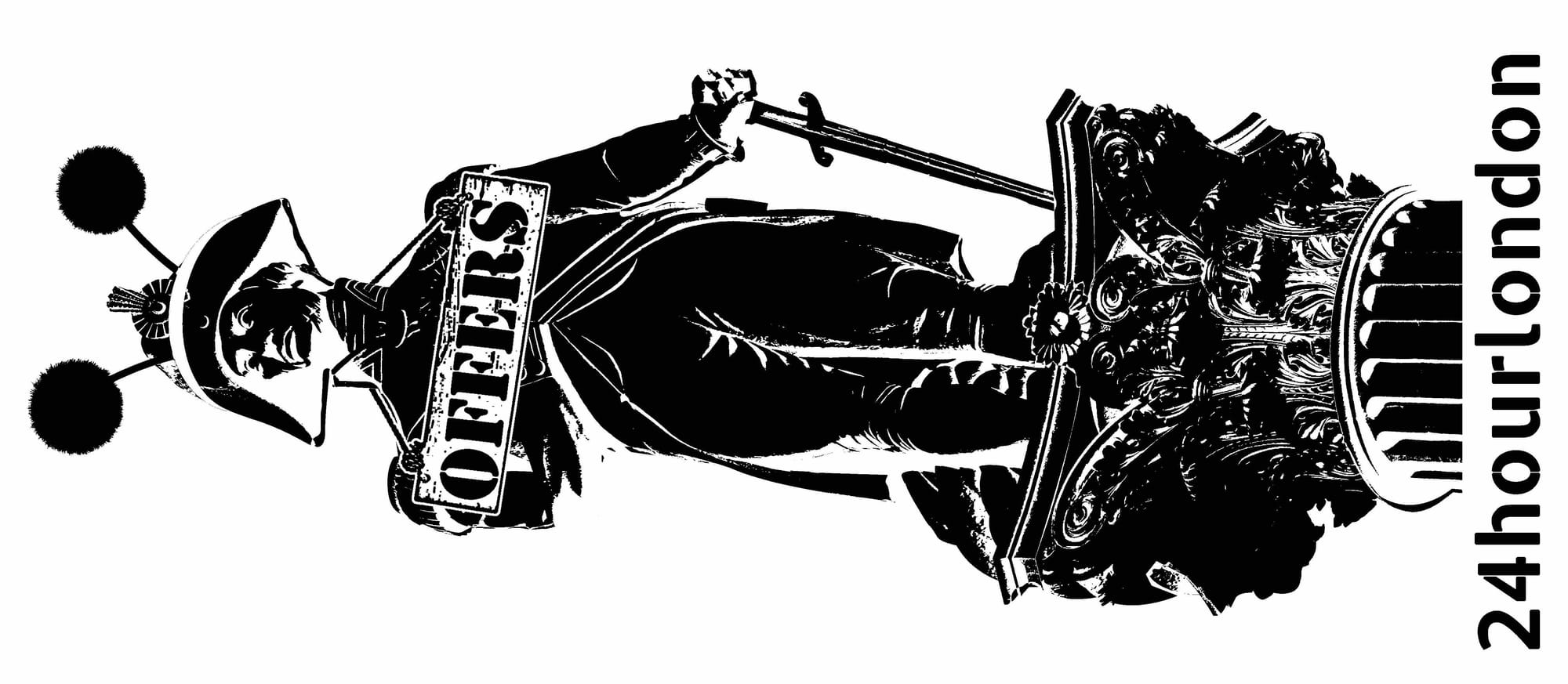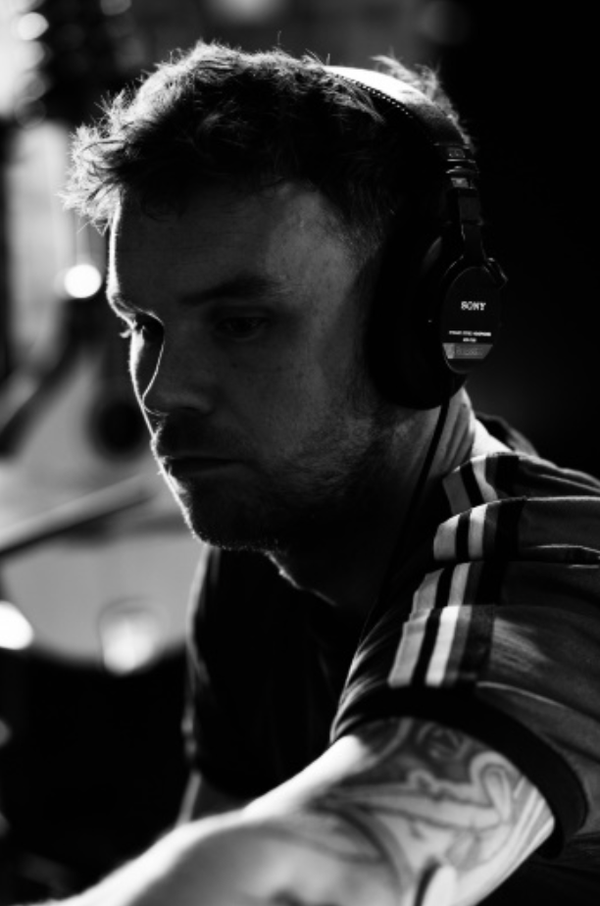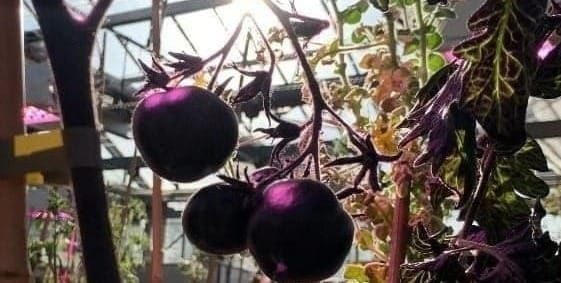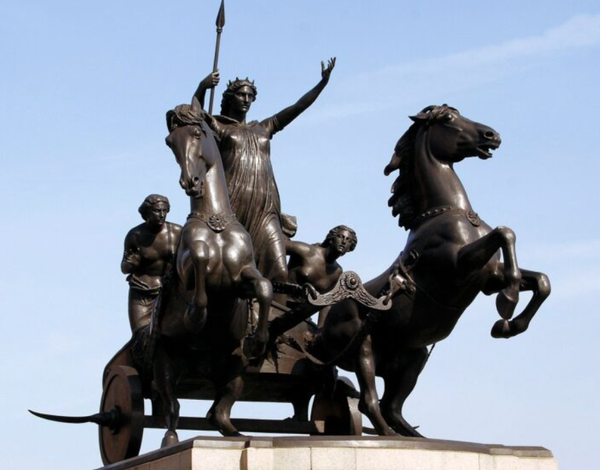Dogged Fuddle: a Tombland tale
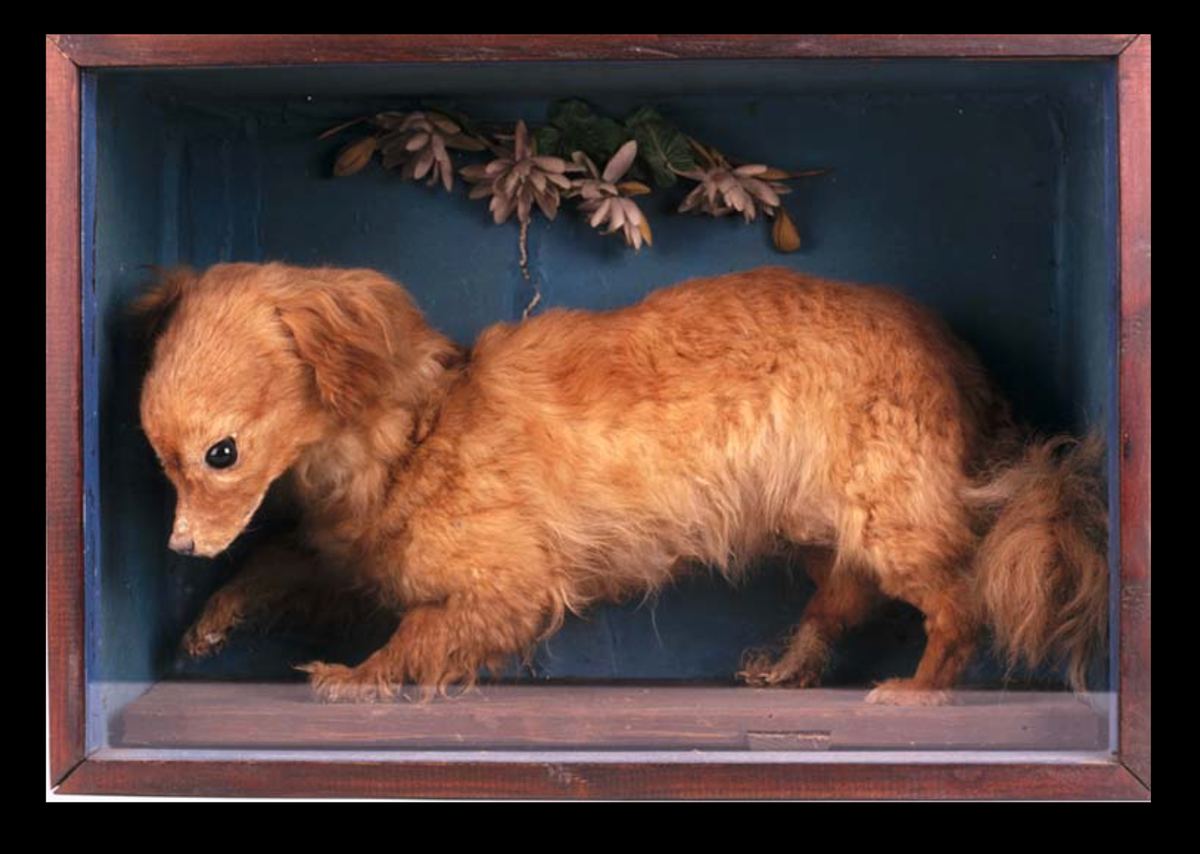
Once upon a time, in 17th century Norwich, there was a little dog called Fuddle. He probably looked a bit like this (above).
Fuddle belonged to a now-extinct class of dog called a Turnspit. (I hesitate to say he was part of a “breed”, since the Kennel Club, which categorises these things, was a distant prospect in Fuddle’s day.) The doggy in the picture – born a couple of centuries after Fuddle and called Whiskey - was a different Turnspit, who was stuffed and displayed in a museum in Abergavenny in the 19th century. What a fate… This is a class of dog, you see, that has been well and truly superseded by technology. Many of us can relate.
Fuddle lived in Tombland and spent his days running in a wheel - like a hamster - that turned a spit of meat. And the lucky beneficiaries of his exertions were the customers of the Popinjay Inn, a pub that was at 29 Tombland for several hundred years, on the spot most recently vacated by All Bar One.
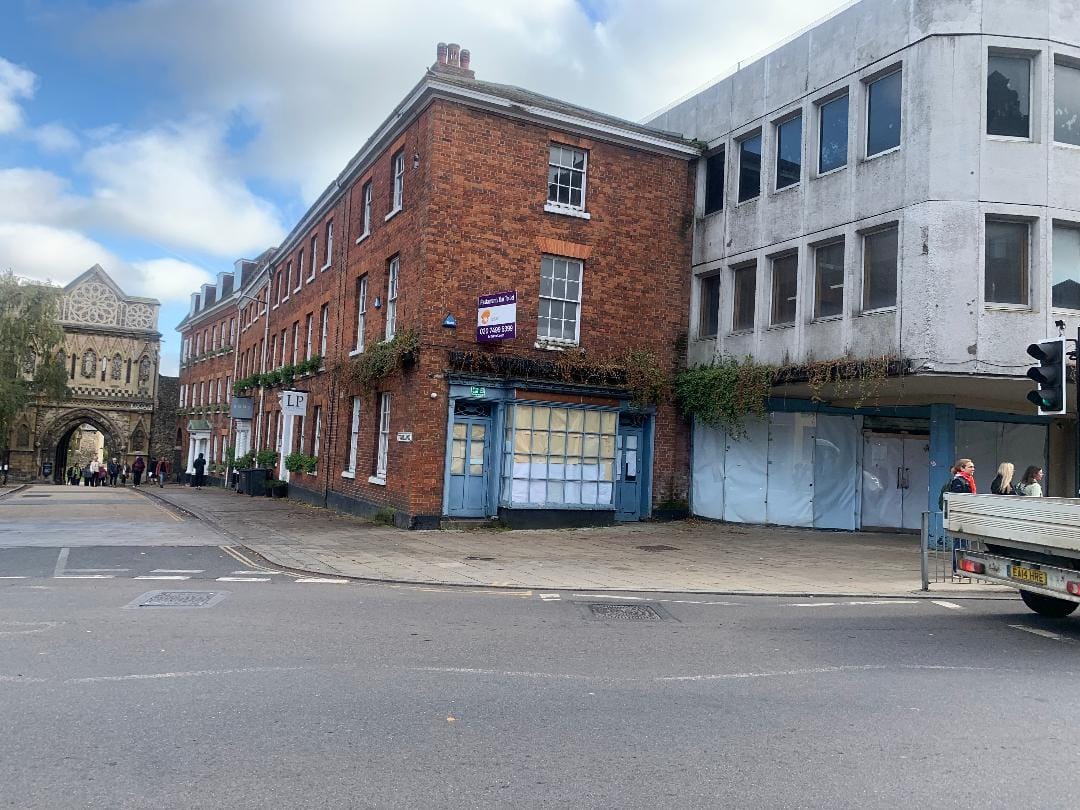
Popinjay is an old English word for a green parrot but it was also the name of the man who owned the building in 1330 and whose son turned it into a pub. It ceased trading as the Popinjay in 1794, when its final licensee, Jacob Watson, went to the King’s Head in Coltishall instead. But while it survived, the Popinjay was Norwich’s oldest – and “most notorious” - tavern, according to local historian EA Tillett. These days, famously, the Adam and Eve has been around the longest, although the building wasn’t always a pub.
Fuddle’s memory survives because a poet called Matthew Stevenson (1654-85) felt warmly enough about him after a few beers to write some verse in his honour. Stevenson is described in the Oxford Dictionary of National Biography as a Norfolk poet “occasionally seen in London, a member of a circle of cavalier wits who haunted the law courts in the years following the Restoration…”
Picture the scene: Stevenson a few tankards of ale the worse for wear, Charles II-style wig on the table in front of him, his eye drawn to Fuddle, pounding away (doggedly?) on his little wheel in the corner.
There’s a copy of the poem at The Forum, in one of the three volumes of Stevenson’s work held in the local history stack.
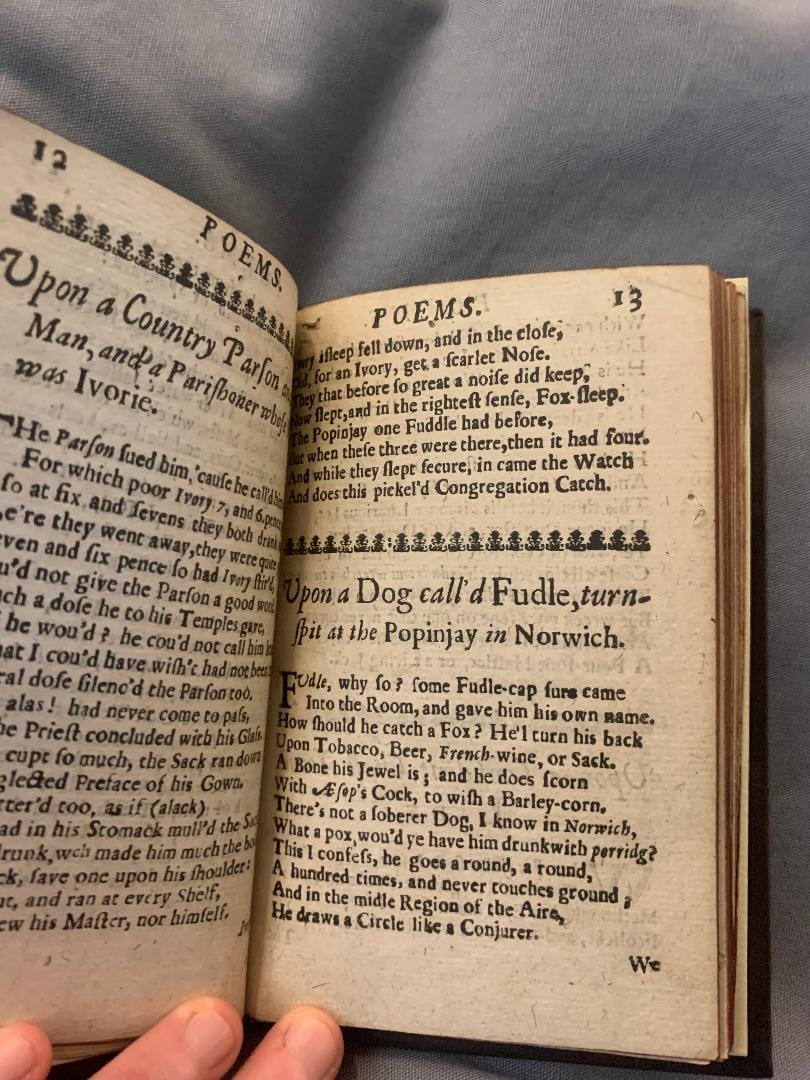
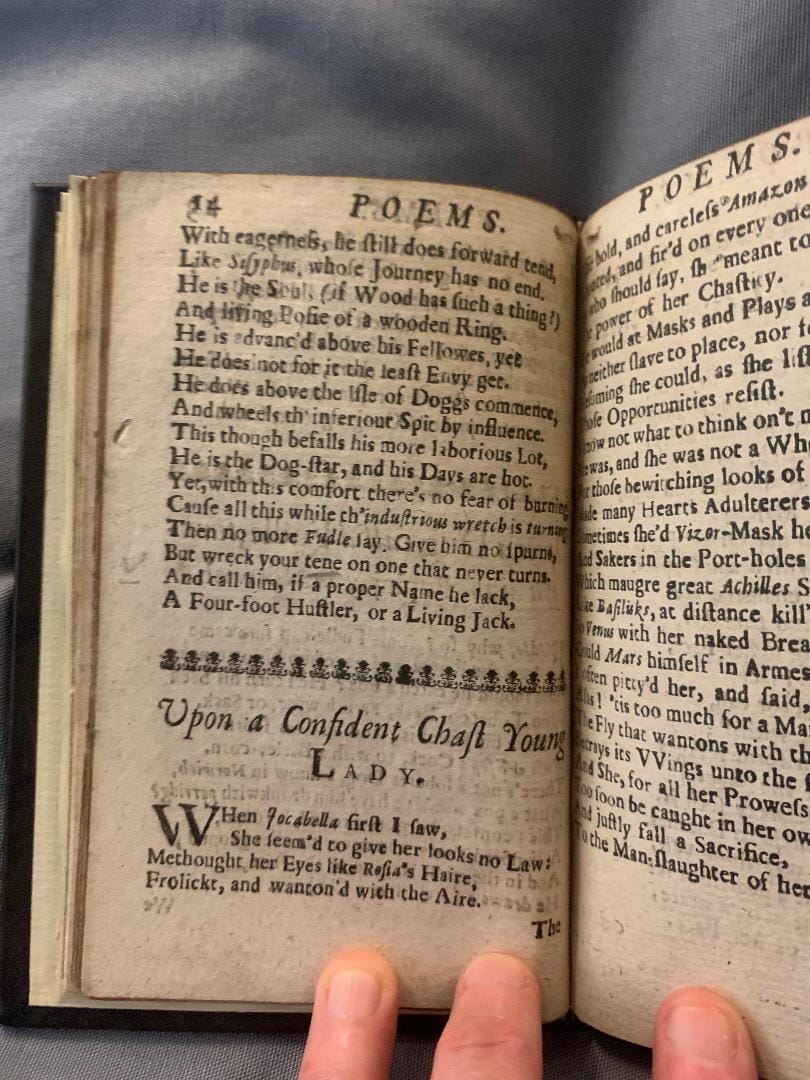
And here’s a transcript, in case the 17th century printing defeats you.
Vpon a Dog call'd Fudle, turn∣spit at the Popinjay in Norwich.
FVdle, why so? some Fudle-cap sure came
Into the Room, and gave him his own name.
How should he catch a Fox? He'l turn his back
Upon Tobacco, Beer, French-wine, or Sack.
A Bone his Jewel is; and he does scorn
With Aesop's Cock, to wish a Barley-corn.
There's not a soberer Dog. I know in Norwich,
What a pox, wou'd ye have him drunk with porridg?
This I confess, he goes a round, a round,
A hundred times, and never touches ground;
And in the midle Region of the Aire,
He draws a Circle like a Conjurer.
With eagerness, he still does forward tend,
Like Sisyphus, whose Journey had no end.
He is the Soul, (if Wood has such a thing?)
And living Posie of a wooden Ring.
He is advanc'd above his Fellowes, yet
He does not for it the least Envy get.
He does above the Isle of Doggs commence,
And wheels th' inferiour Spit by influence.
This though befalls his more laborious Lot,
He is the Dog-star, and his Days are hot.
Yet, with this comfort there's no fear of burning,
Cause all this while ch' industrious wretch is turning:
Then no more Fudle say, Give him no spurns,
But wreck your tene on one that never turns.
And call him, if a proper Name he lack,
A Four-foot Hustler, or a Living Jack.
Fuddle would probably have been dribbling like a water feature due to the smell of the meat he was cooking but couldn’t eat. (If I were Stevenson I would have gone for Tantalus rather than Sisyphus as my classical reference.) And he would probably have been unpleasantly hot from having to run near the fire. In fact, if I’d dropped into the Popinjay with my soppy modern sensibilities and seen Fuddle there, doing his thing, I would probably have thought about calling the RSPCA. Poor little pooch.
And this is the rub. Fuddle seems a good way into a blog about Norwich to me because I’ve been hanging out with my own little furry shadow, called Sophie, recently and thinking about her role in my life – and her own. They say: “If you want a friend get a dog.” Sophie is my friend. And although Cairn terriers were bred for ratting, she doesn’t even chase squirrels, having learned over the years that, athletically speaking, they are way out of her league. She had several litters before coming to us from a breeder as a “retirement girl” at about three years old and now she ekes out an existence as a love object. Suffice to say, she’s very successful on her own terms…
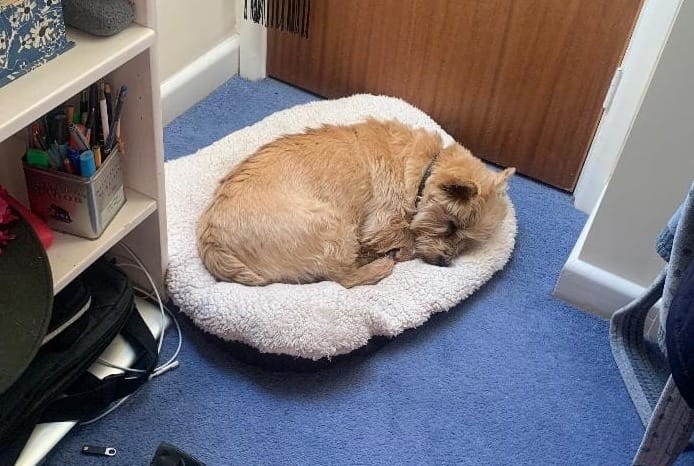
By comparison with Sophie, Fuddle seems to me to be a bit of a hero. A sort of Oliver Twist of the dog world, forced out into the economy to make his living at a time when the role of a dog was different – but still to be near his humans. Because as Professor John Bradshaw makes clear in his fascinating book In Defence of Dogs, dogs and humans are evolving together.
Professor Emma Gilberthorpe, from UEA’s anthropology department, points out that dogs are treated differently in different cultures around the world – and even within the UK. When I was growing up both my sets of grandparents, who lived in Norfolk, had Alsatians, also known as German Shepherds, which were quite fierce. We were certainly brought up to feel wary of them. But you hardly ever even see that breed any more. “I recently went to the Midlands,” said Professor Gilberthorpe. “And we saw a lot of German Shepherds there, which you think of as guard dogs. Whereas in Norwich you get a lot of small dogs and Huskies, for some reason. As an outsider,” she said, “it seems to me that Norfolk has a less aggressive and confrontational culture than the Midlands. Everywhere is different.
“It used to be that dogs had jobs: the cat had a job and the dog had a job too. But in terms of work we don’t need them for that any more. They serve a different purpose now than they did even 50 years ago. The massive increase in dog ownership during Covid points to the fact that we have quite a lonely society, especially for the elderly. And dogs are seen mainly as companions these days.”
But there is more than one thing at play here. People liked having dogs around, even when it was necessary to justify their presence by giving them a job. Professor Bradshaw points out that Turnspit dogs had already been superseded by technology well before Fuddle’s day, since Leonardo Da Vinci sketched a design for a machine that would turn a spit in the 15th century – and the machine may already have been in use rather than his having invented it. Whiskey, whose pic is at the top of this blogpost, is evidence that some people still preferred dogs to tech four centuries later.
It is almost as if the job was an excuse to keep Fuddle around. He certainly inspired a large enough measure of affection in Matthew Stevenson to keep him busy for a few hours writing a poem. And non-working dogs - pets – are luxuries, however integral they become to our lives.
I don’t know about you, but I’d like to see heroic, hardworking Fuddle – and by extension his whole class of long-suffering dogs – commemorated, perhaps by a plaque on the wall of 29 Tombland. And oh look! There’s an organisation that actually does this. Just saying…
Contact me on emma@24hourlondon.co.uk if you’d like to start a petition to get Fuddle a plaque. Or if you know a poem about Norwich that rhymes it with something other than “porridge”. Or if you just have a Norwich story you would like me to look into: news, investigations, try me.
You can also follow me, 24hourlondon and 24hournorwich (!) on social media.
